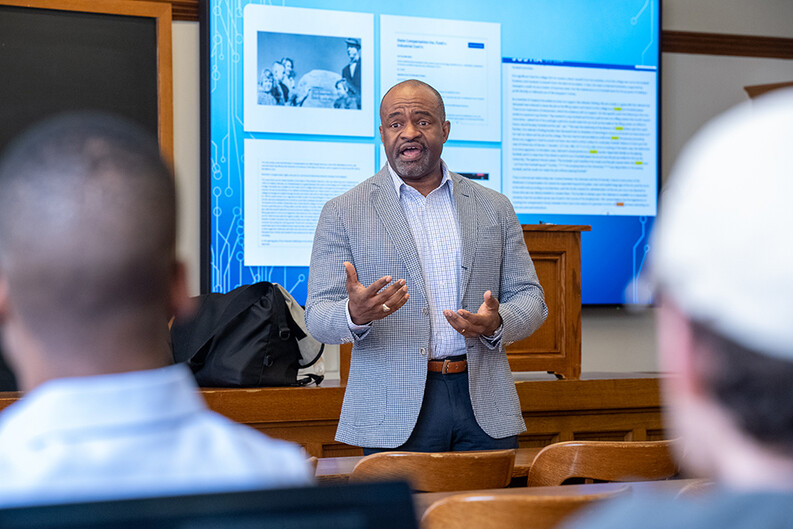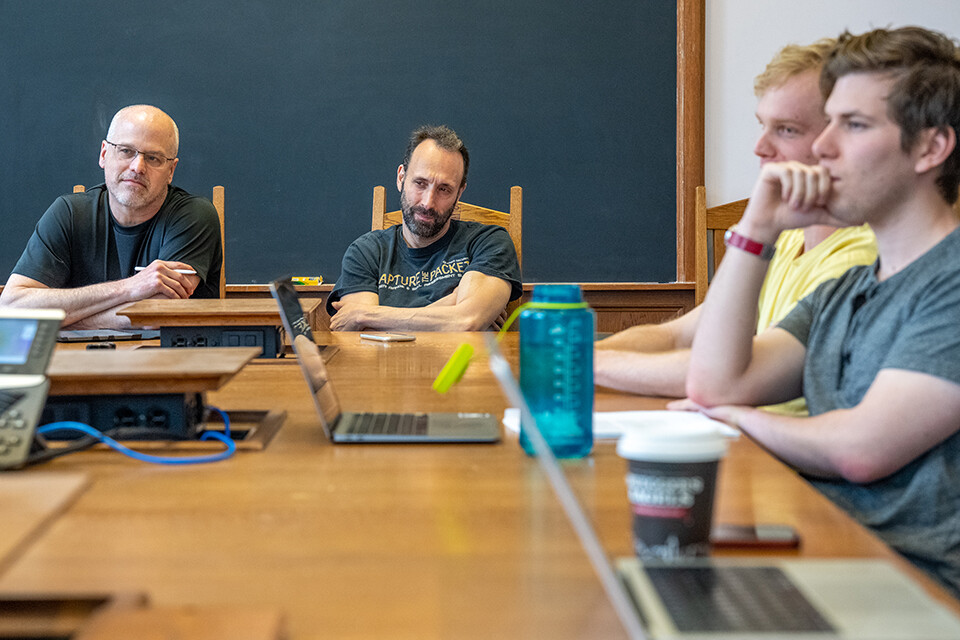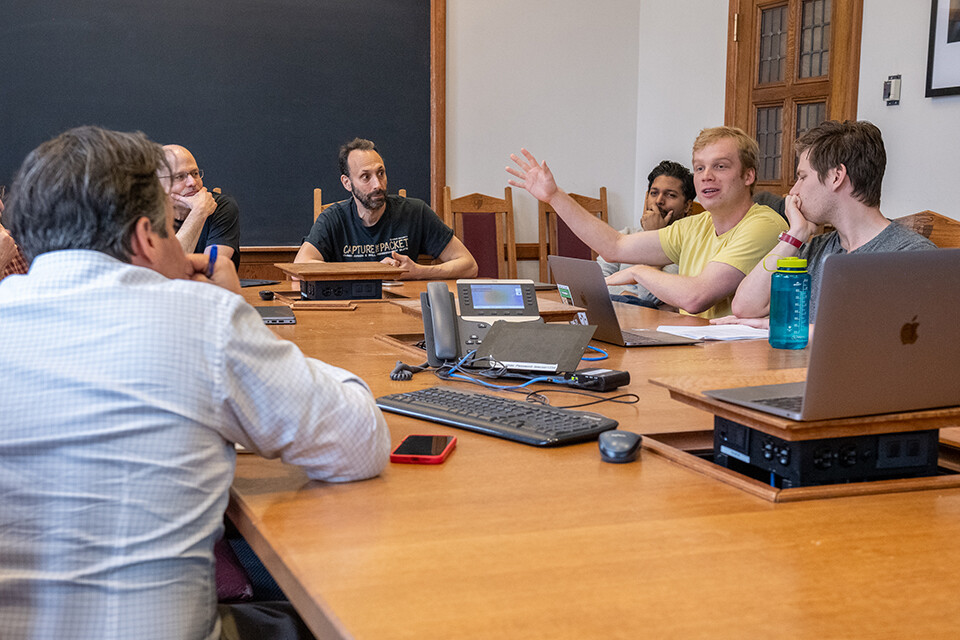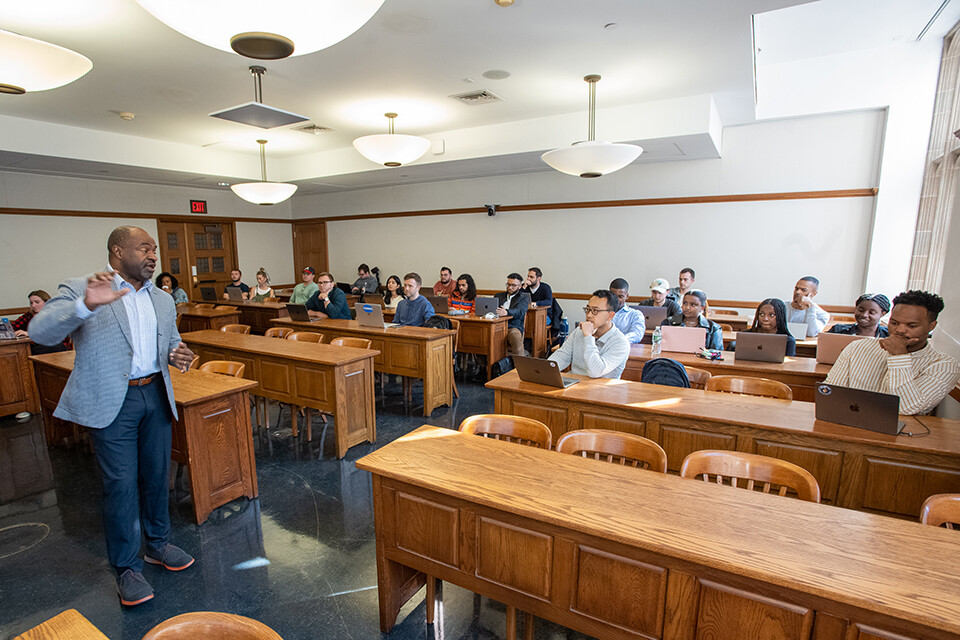The Rules of the Game

Two spring term classes at the Law School — The Jurisprudence of Sports and Law, Leadership, and Ethics in Sports Leagues — may have the word “sports” in their titles, but neither centrally concerns sports law. In fact, the instructors of both classes make clear to students that their classes aren’t even, at their core, about sports. They’re about delving into the ethical, philosophical, and leadership topics that undergird legal practice and systems — and they use sports as a helpful prism to do so.
“If you read the syllabus for my class, the first thing I say is, ‘This is not a sports class.’ It’s a leadership law and ethics-in-business class,” said Visiting Lecturer in Law DeMaurice “De” Smith, executive director of the National Football League Players Association, the union that represents NFL players, who teaches Law, Leadership, and Ethics in Sports Leagues.
In The Jurisprudence of Sports course, considering sports and games proves a useful portal into philosophical discussions, according to Charles F. Southmayd Professor of Law and Professor of Philosophy Scott Shapiro ’90.
“In the philosophy of law, it’s super helpful to see what is like law, just less complex. The thing about sports is it feels law-like but more manageable,” Shapiro said.

Shapiro co-teaches the course with Wesley Newcomb Hohfeld Professor of Jurisprudence Gideon Yaffe and Mitchell Berman, Professor of Law and Philosophy at the University of Pennsylvania Carey Law School.
“The philosophy and jurisprudence of sports is an incredibly helpful way of entering into a much more complex phenomenon, which is legal systems,” Shapiro said.
“The philosophy and jurisprudence of sports is an incredibly helpful way of entering into a much more complex phenomenon, which is legal systems.”
—Professor Scott Shapiro
For one thing, rule frameworks in sports and games are less esoteric and easier to grasp than legal frameworks, Shapiro said — and for another, positions on sports officials’ calls are usually less morally and emotionally loaded than positions on politically charged legal questions.
These differences in complexity help clear the way for explorations of the many conceptual similarities between sports and law. For example, Yaffe said, recent class discussions have revolved around rule-breaking and cheating in sports and games, taking a clear turn toward the philosophy of criminal law, one of Yaffe’s main research interests.
“What makes rule-breaking wrongful or not wrongful?” Yaffe asked.
Such questions can encourage discussion and debate in class and can encourage further inquiry into philosophy issues.

Jack Davidson ’26, a joint J.D./M.B.A student, said that though he was drawn to The Jurisprudence of Sports because he’s an intramural athlete and sports fan, he now finds himself reading about the history of Western philosophy on his own time, to more deeply engage with the topics surfaced in class. “For me, it’s been a very effective and fun gateway into philosophy issues like justice and fairness,” Davidson said.
For its part, Law, Leadership, and Ethics in Sports Leagues focuses more on the questions that surround how sports leagues are run — and treated under the law — as businesses and legal entities.
A boilerplate class covering the legal topics relevant to sports leagues would focus on contracts, antitrust, and labor, according to Smith. “But within those silos of discipline are unique areas of ethics, public policy, medical rights — and a number of interesting questions around how the laws don’t apply in sports the way they normally would,” he said.
Smith decided he wanted to focus his class on these issues rather than classic sports law topics.
“I still consider myself an outsider to the sports world and find so many of the conversations within the sports law world to be consumed with only rules and collective bargaining while the large majority of the business of sports is really about leadership, untested assumptions, and the role of power, politics, and the culture of entertainment,” he said.
In that spirit, Smith begins his classes with a difficult discussion about what sport is as opposed to what activity might be a sport.
That particular focus appealed to Renée Mihail ’24, who had come to law school intending to work on gender justice issues related to employment discrimination — and who had spent much of her life as a competitive athlete. She’d begun to wonder about inconsistencies she saw in the legal protections for professional athletes.
“In the back of my mind is the constant question, ‘What will it take for people to start to view athletes as employees and treat them accordingly?’” Mihail said. “We view sports as a pastime, and think athletes are just lucky to be there, but they are working and they are sacrificing, and they deserve protections as a result.”

Smith brings to the class his experience as the head of the NFL players’ union — and adds that his students quickly see that he approaches labor issues with a “healthy sense of both perspectives.” After all, he points out, he spent many years representing some of the largest corporations in the world as a partner at private law firms. Smith also served as counsel to then-Deputy Attorney General Eric Holder, and has prosecuted criminal cases as an Assistant U.S. Attorney.
Carl Lasker ’24, who took the class last spring, said Smith’s wide range of experience across legal fields is evident in how he approaches the class and its topics — sports-related and otherwise.
“De was just the runner up on the shortlist for the United States Secretary of Labor position — that’s not a position limited to sports,” Lasker said. “He’s tried many, many cases that have nothing to do with sports. And he teaches the class that way.”
Rather than looking to sports as a unifying theme, Smith said his class is more strongly guided by themes of ethics and advocacy. No matter what kind of lawyer a student plans to become, honing their skillsets as an advocate — and understanding their ethical responsibilities as leaders — is crucial. “Advocacy is the way in which we test the rightness, wrongness, the applicability, the jurisprudence of what we do,” he said.
Mihail said that while an interest in sports was what initially drew her to Smith’s class, its broader themes were what ended up resonating most deeply.
“My biggest takeaway was about our role in society as potential lawyers,” Mihail said. “We will be at the nexus of many important decisions, and we need to be comfortable with the consequences. De emphasizes the moral and ethical components of work that we may do, and the decisions we may make.”


